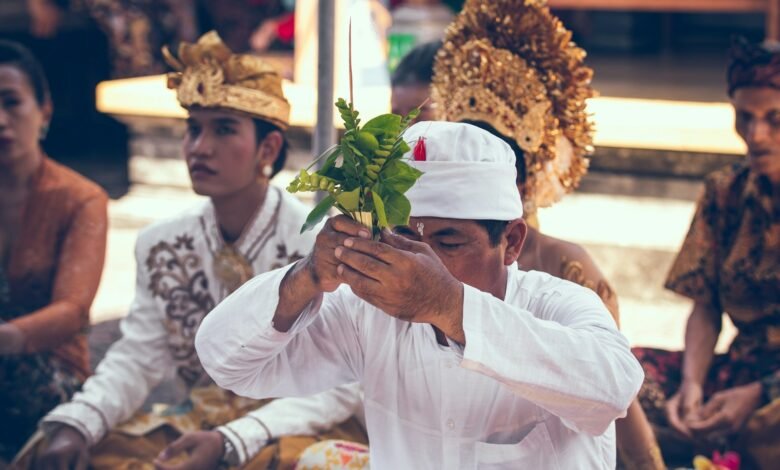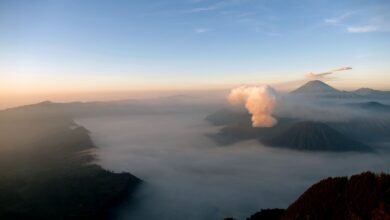Indonesia’s Cultural Festivals

Indonesia is a vibrant archipelago with a rich tapestry of cultural festivals, each reflecting the diverse traditions, religions, and ethnicities across its islands. Here’s a look at some of the most celebrated cultural festivals that provide an authentic glimpse into Indonesia’s heritage.
1. Nyepi (Balinese Day of Silence)
Nyepi, the Balinese New Year, is a Hindu festival marked with a day of complete silence across Bali. Streets and beaches are empty as people observe self-reflection, meditation, and prayer. The day before Nyepi, the “Ogoh-Ogoh” parade takes place, where locals carry large, colorful statues symbolizing evil spirits in a symbolic cleansing ritual.
- When: March (Varies according to the Balinese lunar calendar)
- Where: Primarily Bali
- Highlights: Silence, meditation, and the Ogoh-Ogoh parade
2. Waisak (Vesak)
Waisak, or Vesak, is a sacred Buddhist festival celebrating the birth, enlightenment, and death of Buddha. The grandest celebrations take place at Borobudur Temple, where thousands of monks and devotees gather for a peaceful procession, chanting, and lighting lanterns, creating a beautiful sight against the ancient temple backdrop.
- When: May (Determined by the Buddhist lunar calendar)
- Where: Borobudur Temple, Central Java
- Highlights: Lantern release, chanting, and candle-lit processions
3. Pasola Festival
Pasola is a traditional ritual celebrated by the Sumba people involving a ceremonial horseback spear-fighting event. It is part of the annual Marapu religion’s harvest festival to honor ancestors and pray for bountiful crops. The warriors’ battle on horseback is intense and full of symbolism, attracting locals and tourists alike.
- When: February or March (Dates vary)
- Where: Sumba Island, East Nusa Tenggara
- Highlights: Ritual combat on horseback, traditional dances, and music
4. Bali Arts Festival
This month-long festival showcases Bali’s vibrant culture, with daily performances, exhibitions, and parades. It’s a celebration of Balinese music, dance, crafts, and art. The festival attracts artists from all over Indonesia and is an excellent opportunity for visitors to experience Bali’s traditional and contemporary arts.
- When: June to July
- Where: Denpasar, Bali
- Highlights: Traditional dances, art exhibitions, and cultural parades
5. Toraja Funeral Ceremony (Rambu Solo)
The Rambu Solo is an elaborate funeral ceremony held by the Toraja people in Sulawesi. It’s a multi-day event with sacrificial offerings, traditional dances, and ceremonies honoring the deceased. The Toraja believe that these rituals help the soul reach the afterlife, and the ceremonies can be as elaborate as weddings.
- When: Year-round, but primarily during dry season (July-August)
- Where: Tana Toraja, South Sulawesi
- Highlights: Processions, traditional dances, and elaborate buffalo sacrifices
6. Cap Go Meh
Celebrated by Indonesia’s Chinese community, Cap Go Meh marks the end of the Lunar New Year festivities. This festival features dragon dances, lion dances, and traditional Chinese performances, especially in cities with large Chinese populations. Bogor, Singkawang, and Jakarta are known for hosting the most festive events.
- When: Fifteenth day of the Lunar New Year (February or March)
- Where: Bogor, Singkawang, and Jakarta
- Highlights: Lion and dragon dances, street parades, and traditional Chinese rituals
7. Sekaten
Sekaten is an Islamic festival celebrating the birthday of Prophet Muhammad and includes a week-long event featuring traditional Javanese music, dance, and the sacred gamelan orchestra. It culminates in a grand procession, with the highlight being the gunungan, a mountain-shaped offering of food and flowers symbolizing prosperity.
- When: The month of Maulud (Islamic lunar calendar)
- Where: Yogyakarta and Surakarta, Central Java
- Highlights: Gamelan performances, food offerings, and traditional parades
Conclusion
Indonesia’s cultural festivals showcase the nation’s diversity, offering an immersive experience for visitors and locals alike. From the serene rituals of Nyepi to the vibrant processions of Waisak and Cap Go Meh, each festival provides insight into Indonesia’s spirituality, history, and the importance of community. Witnessing these celebrations is not only a unique travel experience but also an opportunity to honor the rich traditions that define Indonesia.



